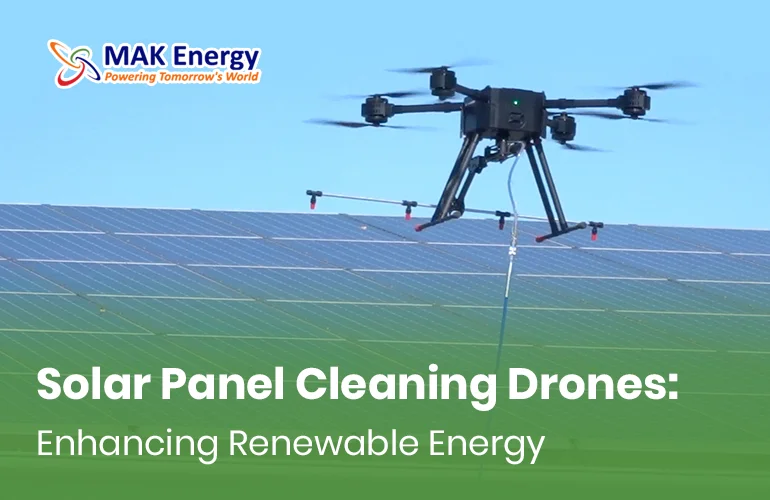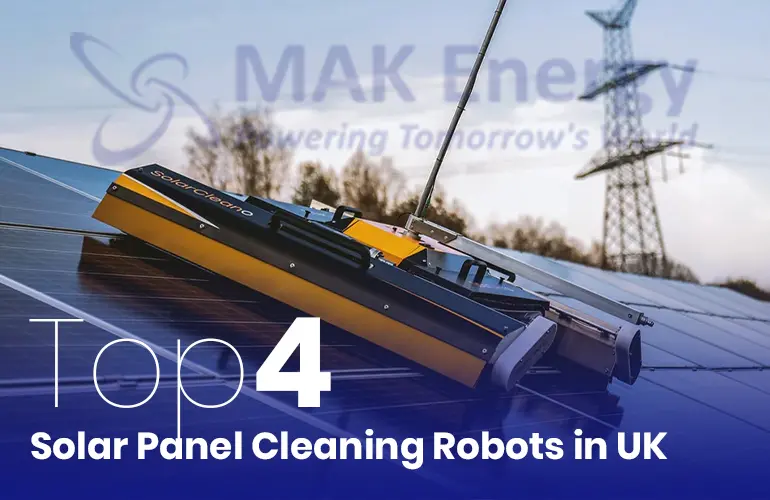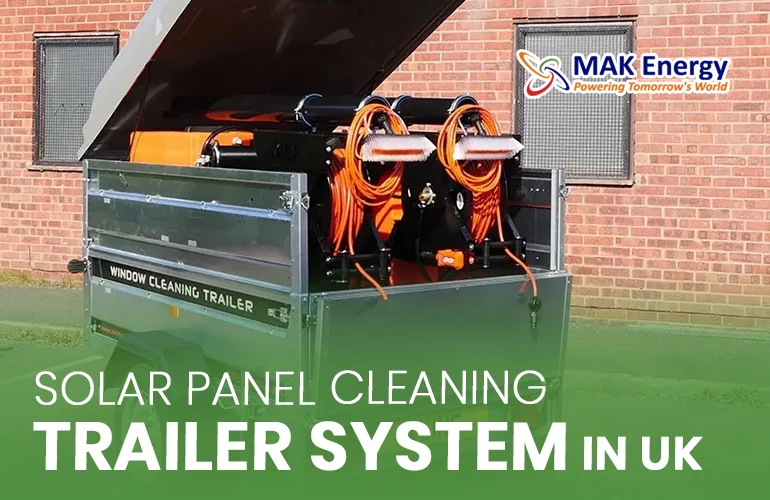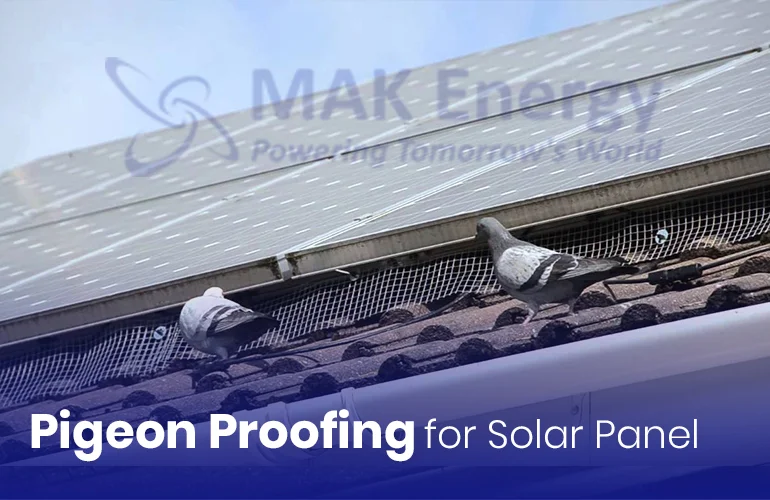The role of advanced technology in every industry is increasing every day. This also applies to the cleaning solar PV industry, where solar panel inverters, maintenance, and cleaning are taking over old and traditional methods. One such advancement in the solar maintenance and cleaning industry is the use of Drones. In this blog, we will look at how drones make solar panels a more efficient source of energy production.
MAK Energy owns all types of Aerial Drones with Cleaning Attachments. The interesting thing is that our cleaning drones are not limited to solar panel cleaning. Whether you need your building, windows, or office glass cleaned, consider MAK Energy your helping hands.
What are Solar Panel Cleaning Drones?
Sure! Solar panel cleaning drones are like little robots that help clean solar panels. They fly over the panels and use special brushes or puffs of air to sweep off the dust and dirt. This allows the panels to catch more sunlight and make more electricity. These intelligent drones can fly by themselves, ensuring they clean the panels well without missing spots. They’re helpful because they can clean quickly and safely without people having to climb up and do it themselves. Plus, they can check the panels to see if everything’s working right. This makes taking care of solar panels easier and cheaper, and it’s good for the planet, too.
How Cleaning Drones Work
Solar panel cleaning with drones has special tools that make cleaning relatively easy and effective. Its working depends on the type of drones used in the solar panel cleaning drones.
High-Pressure Water Jets
The advanced drones have high-pressure water jets that ensure home panels are clean from dirt, birds droppings and dust. They work with High-pressure water jets that can be adjusted depending on the surface being cleaned to avoid damage.
Brushes and Scrubbers
Some drones have rotating brushes or scrubbers for thorough cleaning. These brushes and scrubbers can be combined with water jets or cleaning solutions to ensure a deep clean. The brushes are used to avoid any damage while cleaning the surface gently.
Sensors and Cameras
The most technologically advanced Drones for solar panel cleaning use sensors and cameras to navigate and find the spots that need to be cleaned. The cameras help the drones get a close-up view of the surfaces they are cleaning, making it easier to identify areas that need cleaning. The sensors allow the drones to avoid obstacles and navigate around complex structures.
Remote Control or Autonomous
Another impressive benefit of solar panel cleaning drones is that they can be controlled remotely by an operator or programmed to work on their own. The only thing this type of drone needs is a trained operator, while autonomous drones are equipped with advanced navigation systems that allow them to clean on their own.
Benefits of Cleaning Solar Panels with Drones
The solar industry can benefit from drones and solar panel cleaning. Here are some key benefits they offer:
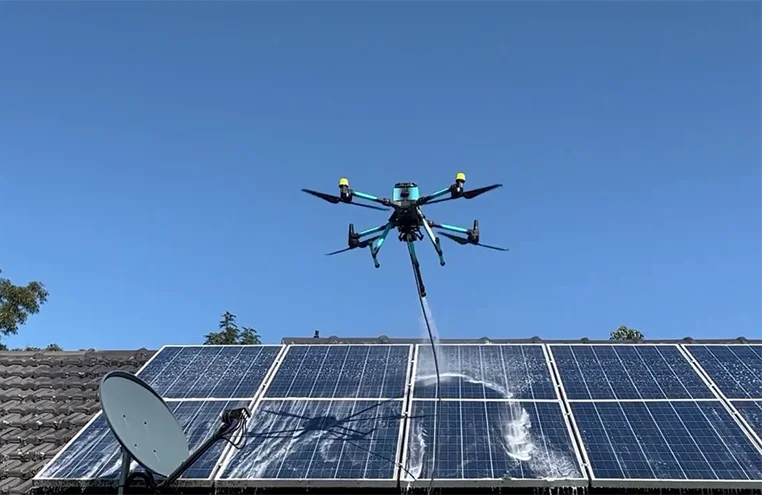
Enhanced Safety
Traditional methods can be risky, especially at great heights. Drones eliminate this risk by doing the job remotely. Workers no longer need to climb scaffolding or hang from ropes, significantly reducing the risk of accidents and injuries. This is particularly important when cleaning tall buildings or other structures that are difficult to access.
Time Efficiency
Drones can clean large areas quickly and efficiently, saving time. Traditional cleaning methods can take a long time, especially for large buildings or industrial facilities. Drones can cover large areas a fraction of the time, making them much more efficient. This time-saving aspect is particularly beneficial for businesses that need to minimize downtime and maintain productivity.
Cost Savings
Though the initial investment is high, the long-term savings in labor and resources are significant. While purchasing and maintaining cleaning drones can be expensive, the long-term savings in labor costs can be substantial. Drones can also reduce the need for expensive equipment like scaffolding and harnesses. Additionally, drones are more efficient, so that they can reduce the overall cost of cleaning services.
Environmental Friendliness
Drones use water and cleaning solutions efficiently, reducing waste and environmental impact. Traditional cleaning methods often use large amounts of water and cleaning chemicals, which can harm the environment. Drones are designed to use these resources more efficiently, minimizing waste and reducing their environmental footprint. This is an essential consideration for businesses that are committed to sustainability.
Versatility
The best thing about drones is that they can be used for multiple other purposes, such as cleaning high buildings, windows, and other glasses of large buildings. This versatility makes them an attractive option for businesses and organizations that need to clean a wide range of surfaces.
Regulations and Challenges Cleaning Solar Panels with Drones
No one can deny every advanced technology’s challenges in this fast-paced era.
Safety
Safety is the most crucial part of panel cleaning, especially when using drones in populated areas. Therefore, Proper drone operator training, regular maintenance of the advanced system, and strict safety protocols are essential parts of every cleaning system. Drones must be operated by trained professionals who understand how to use them safely and effectively. Regular maintenance is also necessary to ensure the drones are in good working condition and to prevent accidents.
Privacy
Another major challenge while cleaning solar panels with drones is the Privacy concerns that can arise when drones are used near homes or private properties. Operators must follow privacy regulations. Drones equipped with cameras and sensors can infringe on people’s privacy. Operators must adhere to privacy regulations and guidelines to ensure that individuals’ privacy is respected. This is particularly important when drones are used in residential areas or near private properties.
Airspace Regulation
Every drone operator must remember this ep while cleaning solar panels or other building glass, either in commercial or domestic areas. Because Drones share airspace with other aircraft, you must follow Regulations to ensure safe coexistence. Drones must be operated in accordance with airspace regulations to avoid conflicts with other aircraft. This includes adhering to altitude restrictions and no-fly zones. Operators must also be aware of and comply with local and national regulations regarding drone use.
Conclusion
Cleaning drones for solar panels makes the Solar PV industry the most advanced and efficient. This blog has mentioned the reasons. They offer enhanced safety, efficiency, and cost savings in various sectors, from commercial buildings to solar panel farms. However, some challenges and airspace regulations must be followed, but this industry has potential for growth and innovation.
The use of drones in the cleaning industry is still in its early stages, but with the advanced equipment MAK Energy owns, the cleaning process becomes more reliable and efficient.
For more information, fill out our quotation form and get advice from our cleaning experts.

